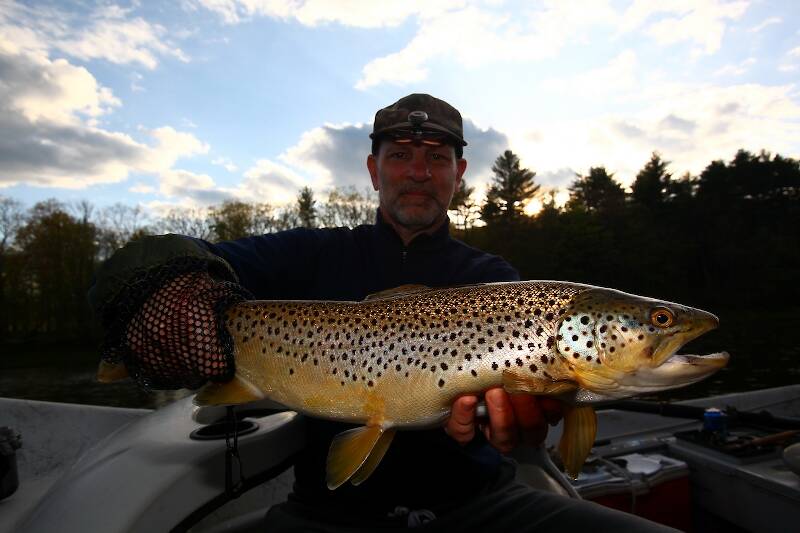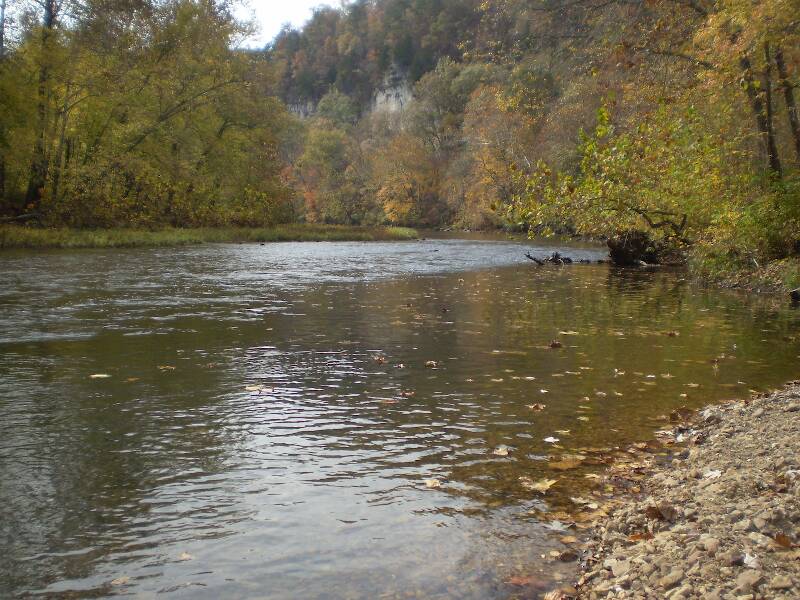
Blue-winged Olives
Baetis
Tiny Baetis mayflies are perhaps the most commonly encountered and imitated by anglers on all American trout streams due to their great abundance, widespread distribution, and trout-friendly emergence habits.
Featured on the forum

This one pretty clearly keys to Kogotus, but it also looks fairly different from specimens I caught in the same creek about a month later in the year. With only one species of the genus known in Washington, I'm not sure about the answer to this ID.

Troutnut is a project started in 2003 by salmonid ecologist Jason "Troutnut" Neuswanger to help anglers and
fly tyers unabashedly embrace the entomological side of the sport. Learn more about Troutnut or
support the project for an enhanced experience here.
Ericd on Apr 7, 2010April 7th, 2010, 4:19 pm EDT
http://dnr.wi.gov/org/nrboard/congress/
There's been a lot of blogging about these guys in my region lately. Does anyone want to shed some of their own info or experience?
Here's an example:
http://www.busterwantstofish.com/
Eric
P.S. There's another "Eric" posting on some of the blogs and websites. It's not me.
There's been a lot of blogging about these guys in my region lately. Does anyone want to shed some of their own info or experience?
Here's an example:
http://www.busterwantstofish.com/
Eric
P.S. There's another "Eric" posting on some of the blogs and websites. It's not me.
RleeP on Apr 8, 2010April 8th, 2010, 3:58 am EDT
>>Here's an example:
http://www.busterwantstofish.com/>>
What follows is just a viewpoint/observation...
A good friend and I who have met for years during the first week of June to fish around SW WI and NE IA had occasion about 4-5 years ago to run into one of the guys listed as the prime movers behind this regs change thing. I won't name names, but he's the DNR guy.
When we met him, he was carrying a clipboard along the stream and said he was a former (retired) DNR supervisor doing angler attitude contract work for the agency. The way the "buster" site portrays him, it seem sort of doubtful he'd be engaged to do this stuff. But the world is full of folks who shade the truth in pursuit of this or that agenda and the internet often only serves to amplify the confusion this causes. That is to say, it is immaterial to me whether he really was doing what he said he was or if the guy who described him on the Buster site is the one shading the truth. Doesn't matter..
At the time we ran into him, we had a pleasant conversation and there was no indication on his part that he had or was promoting the views attributed to him on the site. We ran into him 3 or more times as we hopped around various Grant County streams over the next couple days.
The fact that he had an agenda became manifestly clear later that Summer when he began bombarding my buddy with emails about changing WI trout regs because as things stood, the fisheries were being "underutilized" and young folks were not fishing because of restrictive regs, etc. etc.
My buddy did not respond to these emails other than in a non-committal,"nice to hear from you" way and they soon tapered off.
But he showed me some of them and discussed some others with me. We agreed that at the core of the thing, the real issue the guy had wasn't about trout and regs and the future of fishing. It was more about something we were familiar with based on our experiences in our shared home state: a rural/small town backlash at being invaded by urban/suburban anglers from other states and large cities in his own state. A form of nativism/xenophobia of sorts. You drive over the bridge on a stream you've fished all your life because it was only 10 miles from where you were born and there are 2 cars parked there, both from out of state. I understood/understand the feeling. I grew up in the suburbs of a town of 850 people, 120 miles from the nearest place that had a major league baseball team. I'd drive 200 miles to fish my favorite streams in the mountains of my own state. If I got there and saw a car parked with a license from my state, I was disappointed. If I got there and saw a car with out of state plates, I was angry. Don't ask me the difference. Its visceral and I cannot explain it. I only know how I felt at the time (I've become much more cosmopolitan in the interim...:) ).
This is way long, so let me close by getting to my point..
Within the limited scope of our interactions with this gentleman, my observations and my experience in fishing the region in question, there are all sorts of truths, half-truths and untruths floating around. Everybody has a piece of them. Nobody has them all:
1) Liberalizing and standardizing the trout regs will not increase the number of home area anglers or younger anglers on these streams, nor will it decrease the number of perceived "interlopers" on these waters anymore (to be silly) than posting a photo of Liberace or Don Ameche at every bridge or standing and hopping around in a circle on one foot would. The "complicated regs" thing is a canard and a lashing out in frustration at what is happening to rural America. The DNR guy has picked up on a truth about fishing though; it is slowly losing ground as a pastime in this country. He just has the why of it wrong.. The why is a matter of demography and who we are becoming as a people. More urban, less rural, fewer kids introduced to the sport at an early age and then mentored through all the other things that glitter equally or even more brightly; video gaming, HS sports, etc., until they emerge on the other side as confirmed, adult anglers.
2) The majority of the streams in the region could withstand a 5 fish daily creel and not suffer at all in qualitative terms. (On Edit: I realize there are a number of northern WI guys posting here. I do not presume to opine on their streams or situations. I'm talking specifically about SW WI) These fisheries are not, again for the most part, regs-dependent for their quality, particularly not at current angler usage levels. They are habitat dependent. A generally liberalized creel is nothing to fear.
3) The world is changing right under the feet of our DNR guy and he doesn't like it. I'm not completely happy with the way the world is changing either. He's trying to be true to his home turf and that, IMO, is to be admired, even if grudgingly so. But its a losing battle, at least the way he is approaching it. It is inexorable. Less people are fishing. More of those who are are not keeping fish. The best he can probably hope for is to keep the number of people wearing Art Lee-type bandanas around their neck to a minimum..:)
4) WI's trout management program is nationally recognized as one of the best in the country. It isn't going to change that much if at all from this pressure. The tourism revenue is not insignificant and it is growing. I just it doesn't grow too much before we move back East in a few years...:) Recently, in the wake of the general economic downturn, Super 8 fled the region, and 2 of their motels in hub towns for the region went independent. One replaced the Super 8 logo on their sign with a picture of a guy fishing a spring creek. There's a reason for this.. In the end, its about money and finding a way to scratch out a living. And rightly or wrongly, commerce will trump this well intentioned nativism every time.
Sorry so long..
Lee
http://www.busterwantstofish.com/>>
What follows is just a viewpoint/observation...
A good friend and I who have met for years during the first week of June to fish around SW WI and NE IA had occasion about 4-5 years ago to run into one of the guys listed as the prime movers behind this regs change thing. I won't name names, but he's the DNR guy.
When we met him, he was carrying a clipboard along the stream and said he was a former (retired) DNR supervisor doing angler attitude contract work for the agency. The way the "buster" site portrays him, it seem sort of doubtful he'd be engaged to do this stuff. But the world is full of folks who shade the truth in pursuit of this or that agenda and the internet often only serves to amplify the confusion this causes. That is to say, it is immaterial to me whether he really was doing what he said he was or if the guy who described him on the Buster site is the one shading the truth. Doesn't matter..
At the time we ran into him, we had a pleasant conversation and there was no indication on his part that he had or was promoting the views attributed to him on the site. We ran into him 3 or more times as we hopped around various Grant County streams over the next couple days.
The fact that he had an agenda became manifestly clear later that Summer when he began bombarding my buddy with emails about changing WI trout regs because as things stood, the fisheries were being "underutilized" and young folks were not fishing because of restrictive regs, etc. etc.
My buddy did not respond to these emails other than in a non-committal,"nice to hear from you" way and they soon tapered off.
But he showed me some of them and discussed some others with me. We agreed that at the core of the thing, the real issue the guy had wasn't about trout and regs and the future of fishing. It was more about something we were familiar with based on our experiences in our shared home state: a rural/small town backlash at being invaded by urban/suburban anglers from other states and large cities in his own state. A form of nativism/xenophobia of sorts. You drive over the bridge on a stream you've fished all your life because it was only 10 miles from where you were born and there are 2 cars parked there, both from out of state. I understood/understand the feeling. I grew up in the suburbs of a town of 850 people, 120 miles from the nearest place that had a major league baseball team. I'd drive 200 miles to fish my favorite streams in the mountains of my own state. If I got there and saw a car parked with a license from my state, I was disappointed. If I got there and saw a car with out of state plates, I was angry. Don't ask me the difference. Its visceral and I cannot explain it. I only know how I felt at the time (I've become much more cosmopolitan in the interim...:) ).
This is way long, so let me close by getting to my point..
Within the limited scope of our interactions with this gentleman, my observations and my experience in fishing the region in question, there are all sorts of truths, half-truths and untruths floating around. Everybody has a piece of them. Nobody has them all:
1) Liberalizing and standardizing the trout regs will not increase the number of home area anglers or younger anglers on these streams, nor will it decrease the number of perceived "interlopers" on these waters anymore (to be silly) than posting a photo of Liberace or Don Ameche at every bridge or standing and hopping around in a circle on one foot would. The "complicated regs" thing is a canard and a lashing out in frustration at what is happening to rural America. The DNR guy has picked up on a truth about fishing though; it is slowly losing ground as a pastime in this country. He just has the why of it wrong.. The why is a matter of demography and who we are becoming as a people. More urban, less rural, fewer kids introduced to the sport at an early age and then mentored through all the other things that glitter equally or even more brightly; video gaming, HS sports, etc., until they emerge on the other side as confirmed, adult anglers.
2) The majority of the streams in the region could withstand a 5 fish daily creel and not suffer at all in qualitative terms. (On Edit: I realize there are a number of northern WI guys posting here. I do not presume to opine on their streams or situations. I'm talking specifically about SW WI) These fisheries are not, again for the most part, regs-dependent for their quality, particularly not at current angler usage levels. They are habitat dependent. A generally liberalized creel is nothing to fear.
3) The world is changing right under the feet of our DNR guy and he doesn't like it. I'm not completely happy with the way the world is changing either. He's trying to be true to his home turf and that, IMO, is to be admired, even if grudgingly so. But its a losing battle, at least the way he is approaching it. It is inexorable. Less people are fishing. More of those who are are not keeping fish. The best he can probably hope for is to keep the number of people wearing Art Lee-type bandanas around their neck to a minimum..:)
4) WI's trout management program is nationally recognized as one of the best in the country. It isn't going to change that much if at all from this pressure. The tourism revenue is not insignificant and it is growing. I just it doesn't grow too much before we move back East in a few years...:) Recently, in the wake of the general economic downturn, Super 8 fled the region, and 2 of their motels in hub towns for the region went independent. One replaced the Super 8 logo on their sign with a picture of a guy fishing a spring creek. There's a reason for this.. In the end, its about money and finding a way to scratch out a living. And rightly or wrongly, commerce will trump this well intentioned nativism every time.
Sorry so long..
Lee
Martinlf on Apr 8, 2010April 8th, 2010, 4:14 am EDT
Thoughtful, intelligent analysis. I believe this will be true in many states. Some will, with purpose, take an interested youngster under his or her wing, but computers and malls are claiming the attention of more and more kids these days. And the fly fishers who are out there will seek out any stream that holds fish, wherever it is, if they can afford to reach it. I'm not happy to find anyone in a favorite spot (except, perhaps, a close buddy) but I try to be cordial when it happens, and to be honest, I typically just hope there's nothing hatching that day :). Ultimately, we are all from out of town in one way or another. --Louis
"He spread them a yard and a half. 'And every one that got away is this big.'"
--Fred Chappell
--Fred Chappell
Troutnut on Apr 8, 2010April 8th, 2010, 7:25 am EDT
I've got only passing familiarity with the controversy over those Driftless Area streams, and it's been covered better by RleeP and Louis, so I won't comment on that.
However, I do think the Conservation Congress in general is a very bad idea for modern resource management. The same goes for similar systems in many other states in which resource management decisions rest with either ordinary citizens or politically appointed boards.
Management decisions should be made only by scientists who are best prepared to understand the likely effects of those decisions. They should be made with the public's priorities for the resource in mind, and designed to strike a balance between the priorities of different interest groups and capacity of the resource. Two of those tasks, estimating the capacity of the resource and predicting the effects of management decisions, require scientific training and experience.
Unfortunately, in too many states, the final authority on these should-be-scientific decisions is a political body of some sort. Sometimes, it's a panel of governor's appointees, and that's the sort of "low-level" position governers like to use to reward their campaign fundraisers or to pander to a certain interest group. Expertise is not always the deciding factor in those appointments.
In Wisconsin, regulation decisions must effectively pass through the votes of a large group of locally elected ordinary citizens, the Conservation Congress. They taut this as some laudable "grassroots" policy-making, but it just doesn't make sense for resource management. Here's a fictitious but typical example: Why should a musky angler from Duluth-Superior have a vote on the bluegill length limit for some lake by Milwaukee? What does he know about bluegills, or Milwaukee? And should one of those Milwaukee bluegill fishermen be voting on his Superior-area musky regs?
The three big problems with this boil down to:
The solution to all these problems is to put more power in the hands of local managers who know the local resources, know their user groups, and have the scientific expertise to balance the desires of those user groups within the constraints imposed by the resources.
However, I do think the Conservation Congress in general is a very bad idea for modern resource management. The same goes for similar systems in many other states in which resource management decisions rest with either ordinary citizens or politically appointed boards.
Management decisions should be made only by scientists who are best prepared to understand the likely effects of those decisions. They should be made with the public's priorities for the resource in mind, and designed to strike a balance between the priorities of different interest groups and capacity of the resource. Two of those tasks, estimating the capacity of the resource and predicting the effects of management decisions, require scientific training and experience.
Unfortunately, in too many states, the final authority on these should-be-scientific decisions is a political body of some sort. Sometimes, it's a panel of governor's appointees, and that's the sort of "low-level" position governers like to use to reward their campaign fundraisers or to pander to a certain interest group. Expertise is not always the deciding factor in those appointments.
In Wisconsin, regulation decisions must effectively pass through the votes of a large group of locally elected ordinary citizens, the Conservation Congress. They taut this as some laudable "grassroots" policy-making, but it just doesn't make sense for resource management. Here's a fictitious but typical example: Why should a musky angler from Duluth-Superior have a vote on the bluegill length limit for some lake by Milwaukee? What does he know about bluegills, or Milwaukee? And should one of those Milwaukee bluegill fishermen be voting on his Superior-area musky regs?
The three big problems with this boil down to:
- Scale - Every local issue is primarily voted on by people from other areas of the state who have no stake in it.
- Expertise - Most people only have knowledge, even as users, of a minority of the issues before the Congress. Few if any of them have scientific expertise on any of the issues. The public's rightful place in management is setting the priorities for a resource. Specific regulations, such as length and harvest limits, are tactical tools used to achieve those priorities, and they should be applied by scientists who understand how they work. We should not set length limits Democratically for the same reason we do not vote Democratically on every missile launch during wartime: they are tactical decisions that should be made by specialized experts.
- Politicization of science - As if putting scientific decisions in the hands of non-scientists weren't bad enough, Wisconsin's system also encourages political foodfights by rewarding the winners with influence. A decision about C&R vs meat fishermen may end up reflecting the interest groups that did the best job riling up the public and stacking the Conservation Congress in their favor.
The solution to all these problems is to put more power in the hands of local managers who know the local resources, know their user groups, and have the scientific expertise to balance the desires of those user groups within the constraints imposed by the resources.
Jason Neuswanger, Ph.D.
Troutnut and salmonid ecologist
Troutnut and salmonid ecologist
Motrout on Apr 8, 2010April 8th, 2010, 10:44 am EDT
That's an excellent post, very informative. I've long been an advocate of taking the politics out of fish and game management, and your post sums that up better than I could.
"I don't know what fly fishing teaches us, but I think it's something we need to know."-John Gierach
http://fishingintheozarks.blogspot.com/
http://fishingintheozarks.blogspot.com/
RleeP on Apr 8, 2010April 8th, 2010, 12:04 pm EDT
I agree. Well said, Jason.. And I think that a pretty fair number of states try to do it this way, or at least as nearly as possible given the authority/intellectual suspicious nature of much of their respective user bases, the folks who buy the licenses and hence, collectively, have the biggest stick of all in these dust-ups.
These attitudes are a real problem and an impediment to sound biological management in some cases. If you want to read a real horror story about the clash between the user base and biologists and how badly it can turn out for the resource, Google "Gary Alt, Pennsylvania Game Commission" and/or "Deer Management Conflicts in Pennsylvania". They ran one of the brightest and most innovative wildlife biologists in the country out of the state (and as I understand it, out of the field as well). The PA guys here (those who hunt anyway) will know the story. It's a cautionary tale of how badly this stuff can go when certain portions of the user base decide that science is voodoo and then proceed to assert their muscle through the political process.
These attitudes are a real problem and an impediment to sound biological management in some cases. If you want to read a real horror story about the clash between the user base and biologists and how badly it can turn out for the resource, Google "Gary Alt, Pennsylvania Game Commission" and/or "Deer Management Conflicts in Pennsylvania". They ran one of the brightest and most innovative wildlife biologists in the country out of the state (and as I understand it, out of the field as well). The PA guys here (those who hunt anyway) will know the story. It's a cautionary tale of how badly this stuff can go when certain portions of the user base decide that science is voodoo and then proceed to assert their muscle through the political process.
Joekrz on Apr 11, 2010April 11th, 2010, 1:16 am EDT
Questions of concern at the CC hearings Monday evening:
QUESTION 52 – Wolf River trout regulations
Do you favor making the trout regulations during the regular season (first Saturday in May through September 30) on the Wolf River in Langlade County the following: daily bag limit of 3 trout under 12”, artificial lures only? The October 1-November 15 catch-and-release season will be retained for the entire length of the Wolf River in Langlade County.
QUESTION 59 – Waupaca River trout regulations
Do you favor decreasing the minimum size restrictions on all trout to 7”, and increasing the daily bag limit to 5 fish from 3 fish on the Waupaca River below River Road (Waupaca County)?
QUESTION 87 – Extension of the inland trout season
Would you support the inland trout season to open the first Saturday closest to May 1st and continue though October 31st?
QUESTION 88 – Open the Wisconsin inland trout season one week prior to the regular fishing season opener.
Would you support the inland trout season to opening one week earlier than the general fishing opener?
---------------------------------------------------------------------
It also rumored that there will be a proposal submitted in each county to increase the bag limits to 5 state wide and to open the early C & R season during March and April to a harvest / live bait season.
If this proposal is presented in your county, stand up and reject it. Section X-C-1 of the Congress Code of Procedure states "Only the individual author or designated representative of an organization may present a resolution within the county."
Here is the link to the resolution. If one of the authors of this resolution is not present in your county, it can't be submitted for consideration.
http://img.photobucket.com/albums/v336/joekrz/April122010resolution.jpg
QUESTION 52 – Wolf River trout regulations
Do you favor making the trout regulations during the regular season (first Saturday in May through September 30) on the Wolf River in Langlade County the following: daily bag limit of 3 trout under 12”, artificial lures only? The October 1-November 15 catch-and-release season will be retained for the entire length of the Wolf River in Langlade County.
QUESTION 59 – Waupaca River trout regulations
Do you favor decreasing the minimum size restrictions on all trout to 7”, and increasing the daily bag limit to 5 fish from 3 fish on the Waupaca River below River Road (Waupaca County)?
QUESTION 87 – Extension of the inland trout season
Would you support the inland trout season to open the first Saturday closest to May 1st and continue though October 31st?
QUESTION 88 – Open the Wisconsin inland trout season one week prior to the regular fishing season opener.
Would you support the inland trout season to opening one week earlier than the general fishing opener?
---------------------------------------------------------------------
It also rumored that there will be a proposal submitted in each county to increase the bag limits to 5 state wide and to open the early C & R season during March and April to a harvest / live bait season.
If this proposal is presented in your county, stand up and reject it. Section X-C-1 of the Congress Code of Procedure states "Only the individual author or designated representative of an organization may present a resolution within the county."
Here is the link to the resolution. If one of the authors of this resolution is not present in your county, it can't be submitted for consideration.
http://img.photobucket.com/albums/v336/joekrz/April122010resolution.jpg
Quick Reply
Related Discussions
Topic
Replies
Last Reply
3
May 19, 2020
by Jmd123
by Jmd123









